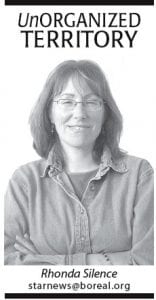The first meeting of the Cook County commissioners each year is normally not a very interesting event. New or re-elected commissioners and other government officials are sworn in and the county board spends about an hour on housekeeping matters. The most exciting part of the meeting is usually the nomination and election of the new county board chair.
However this year, even that was anticlimactic, as I presumed Commissioner Jim Johnson would be named chair this year. It is an unwritten rule that each member of the county board takes on the task of board chair for a year or two. Since the incumbent board members—Jan Hall, Bruce Martinson, and most recently Fritz Sobanja—have had their turns and because Sue Hakes had just been elected, it was likely that Johnson would be selected, and he was.
I’m sure Jim also expected the change. It took only a few minutes for Fritz and him to switch places. He grinned as former Chair Fritz said, “Welcome to the hot seat.”
Moments later, discussion did become heated after a suggestion from our county attorney, Tim Scannell. Tim suggested that the county board attempt, in the coming year, to keep public comment to an allotted time at each meeting. ISD 166, the City of Grand Marais, and the Cook County – Grand Marais Economic Development Authority (EDA) all do this. Each of these entities has a line item on its agenda—“Public Comment”—during which citizens may appear to make comment on agenda matters or to bring up new concerns.
I know that Tim had the best of intentions. I have sat in many a meeting that dragged on far too long as community members droned on and on. I have shared the frustration of our government representatives when four different constituents speak up to say basically the same thing. And I have struggled to be patient when a citizen strays from the topic at hand into unrelated matters.
Tim made a good point when he said public hearings are the time for give-and-take discussion. I can empathize with county staff that meets for weeks or months or years with the public, trying to resolve an issue, only to have the solution shot down by the county board.
But it is also part of the grassroots government process. Sometimes people don’t realize there is a matter that they feel strongly about until it gets to the county board. They should still have the opportunity to have their say.
There are also individuals who serve on committees and task forces and work really hard to get county employees to see things their way. When they don’t get the results they want, they should have the right to appear before the county board for a last ditch effort. The county board is a sort of local appeals court.
I hope that doesn’t change. One reason I am so heartily opposed to this is because most citizens don’t have time to get to the morning meetings of the county board. If the public comment period is set for the beginning of the meeting, that would mean citizens would need to be there at 8:30 a.m. That is not so bad and it actually may be somewhat convenient. Some folks could appear at the meeting before heading to the office or job site.
But, what if the actual conversation about the matter they care about is not on the agenda until 9:00 or 10:00 or 11:45 a.m.? They then have to make a tough choice. Come to the meeting at 8:30 a.m., speak their piece and carry on with their day, hoping the commissioners will remember their comments when the issue is debated later? Or leave the meeting to work for an hour or two and return to listen to the discussion? Or, waste several hours of their working day sitting through other agenda items. All the while knowing that they won’t be able to comment later—even if they have pertinent information.
As part of his appeal to enact this designated comment period, Tim Scannell noted that our commissioners are very accessible. Constituents can call them or e-mail them or stop them on the street to discuss concerns. Tim said commissioners do a good job advocating for their electorate. I agree, but I still think it is important for commissioners to be receptive to comments at the board meeting where decisions are actually made.
If you agree, use your commissioner’s accessibility to let them know how you feel.
I don’t think a restricted comment period is needed if there is a strong board chair who controls the meeting. A board chair needs to limit the time that people speak while ensuring that everyone is heard. It can be done. It has been done. I wish the new board chair the best of luck in getting it done.
Welcome to the hot seat, Jim! Too bad that all the people who know how to run the country are busy driving taxicabs and cutting hair.
George Burns



Loading Comments